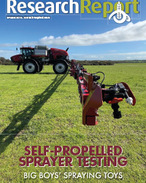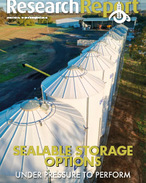This article is 9 years old. Images might not display.
The WA branch manager said it was time agriculture looked to the mining sector, as many of the things agriculture sector needs to do now are the same things the mining sector had to do in the recent past.
"Agriculturists can learn from the way the mining sector successfully raised its investment funds and they need to ask if the same approach can be used in agriculture," Bradshaw said.
The advisory firm manager said mining companies were so successful because they focused on the entire supply chain - from the mine through to the product's ultimate customer.
"They understood products pass through a chain of activities in order, with each element critical to the quality of the final product. Miss an element and the product can't be delivered to the customer, mismanage an element and the product is not economic," he said.
"In doing this, the mining sector realised the value chain itself had a value. While an investment could be made directly in an asset such as a mine, other investment funds could be directed to making improvements in the value chain that enhances and delivers the product to customers.
"It is still difficult to achieve this type of value-chain investment in agriculture. There are pockets where it exists, of course. The grains growers co-operative CBH is strong on 'joined up thinking', but it's unrealistic to expect a single cooperative to grow an entire industry and all its subsectors."
Bradshaw said there are glimmers of what's possible starting to emerge after years of "emotional debate" around foreign ownership that evokes "primal" food security concerns, stating that Australia needs large scale investment in its agriculture sector if it is to achieve its potential, and right now the funds required are not available from any local source.
Citing the joint venture agreement signed between China's Taihua and Ipswich's Churchill Abattoir where the Chinese producer and distributor of frozen food upgraded the abattoir to export status and added a second daily slaughter shift. Importantly Bradshaw notes Taihua didn't buy the Ipswich plant as a free-standing asset.
"Instead, Taihua made a deliberate investment in the supply chain. This includes establishing a boning room in China, new plate-freezing infrastructure in Australia, as well as providing a market for Australian offal," he said.
"Taihua uses its existing and extensive distribution network in China to sell beef far and wide. From its base in Shandong Province, the company has established a cold chain distribution network that allows small deliveries to any city in China within 24 hours."
The Advisian manager said if investors were given the opportunity to buy into a given value chain, then the issues about foreign ownership that arise now would no longer matter.
"At present, the main path for foreign investors is to go the traditional route of buying assets. I've heard of situations where carloads of Chinese investors finish up driving around the countryside, stopping at farm gates, attempting to negotiate with individual farmers. As each party in the transaction has insufficient information about the other's needs, it tends not to go well.
"Value-chain investing is a way of unlocking Australia's agricultural potential while overcome both justified and unjustified public concerns."























